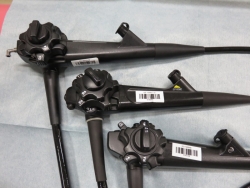
Our department performs 80 to 90 cases of stomach surgery in a year, and the most common cases are gastric cancer. The prognosis for gastric cancer is good if discovered at initial stages, so early detection is of utmost importance. For this reason, we encourage everyone to be certain to have regular medical check-ups.
In 2005, we adopted a laparoscopic-assisted, minimally-invasive distal gastrectomy for initial stage 1 cancer. This highly successful program was the first to be implemented in the Bingo District.
Laparoscopic surgery is a surgical operation which uses a camera called a laparoscope to display the inside of the abdomen on a TV monitor, while small holes are opened in the abdomen to perform surgery. The merits of this surgical procedure include less pain, quick recovery and return to everyday life and work, and small, inconspicuous scars. While we conduct standard laparotomy for advanced gastric cancer of stages 2 and beyond, we are also perform preoperative chemotherapy for cases with prominent lymph node metastasis, or cases when we cannot certainly conclude if resection is possible. We hold a weekly gastrointestinal conference to discuss and decide the treatment policy in accordance with gastric cancer treatment guidelines.
We have recently opened a minimally invasive treatment center, with Dr. Otsuka in charge of surgery, and Dr. Hasegawa in charge of urology. Minimally invasive treatment is a general term for surgery which is performed with using a laparoscope or a thoracoscopy. The goal of this method is to perform surgeries which leave smaller scars and create less stress for the patient.